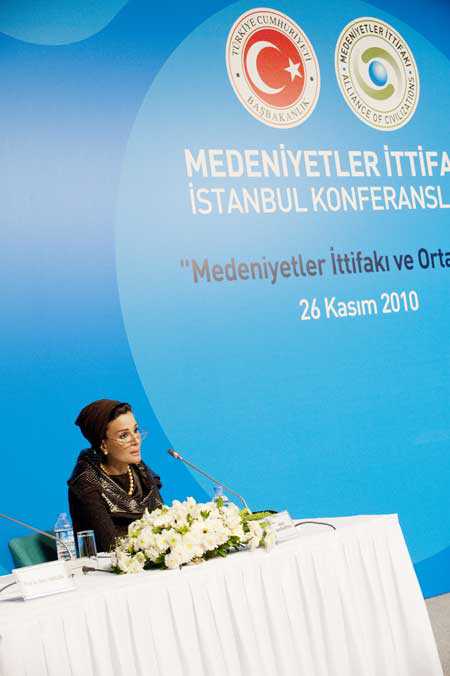On April 6-7, Istanbul hosted the second United Nations Alliance of Civilizations (UNAOC) forum, co-chaired by Turkey and Spain under the auspices of the UN to foster international dialogue and cooperation. The forum was attended by five heads of state, 26 foreign ministers, 11 ministers and high-level officials from 12 international and regional organizations, providing an opportunity for Ankara to discuss bilateral relations with its neighbors and showcase Turkey’s growing international profile (Anadolu Ajansi, April 7).
The UNAOC began in 2004 following the Madrid bombings, as part of Spanish Prime Minister Jose Luiz Rodriguez Zapatero’s aim of building closer links between the Western and Islamic worlds, and combating terrorism through dialogue rather than force. Turkish Prime Minister Recep Tayyip Erdogan supported this idea, which became a joint Spanish-Turkish initiative. In addition to several working meetings, its first forum was hosted by Spain in January 2008 and around 100 countries have joined the organization (www.aocistanbul.org; www.unaoc.org).
The second UNAOC forum reflected the high value placed on resolving common problems through dialogue. In their addresses, world leaders also emphasized the promotion of mutual respect, tolerance and diversity, to overcome conflict and achieve peaceful coexistence (www.ntvmsnbc.com, April 7). UN Secretary General Ban Ki-moon highlighted the possible conflict prevention role of the platform: “All too often, the United Nations must deal with fires after they break out. Through the UNAOC, we can stamp out the sparks before they catch” (Today’s Zaman, April 7).
Participants submitted their national plans and regional strategies for joint projects and agreed on developing programs to increase communication among the young and facilitate greater access to information technology to promote intercultural understanding. Additional programs will support academic research, organize workshops to study the challenges of doing business in a multicultural environment, and develop joint media educational programs (Cihan Haber Ajansi, April 7).
Moreover, the UNAOC plays a major part in the foreign policy agenda of Turkish Prime Minister Erdogan and his governing Justice and Development Party (AKP), which has supported the initiative since its inception. The project has been used by the AKP to advance its political vision, emphasizing dialogue and consensus in conducting Turkey’s foreign relations. This is an extension of their own transformation from a more doctrinaire, anti-Western Islamic movement to a pro-EU, moderate conservative party. Fostering international dialogue is regarded as vindication of the AKP’s image as a movement which synthesizes Western and Islamic values. Most importantly, Turkey’s leading role in this new forum is valuable for the AKP’s leadership, offering a high profile opportunity to represent the Muslim world, which they view as a core mission (Radikal, November 12, 2006).
The AKP government has recently undertaken several initiatives reflecting their belief that Turkey could serve as a bridge between East and West, and advocate the rights of the Islamic world. For instance, Turkey’s policy during the Gaza crisis, or its position over appointing the new Secretary-General of NATO was driven by such considerations. Critics allege that Turkey might be drifting away from the transatlantic community and becoming more Middle Eastern. Nonetheless, the AKP has insisted that the party remains committed to the country’s Western orientation, and these new openings within the Islamic world should be interpreted as complementary to Western interests in the strategically vital regions surrounding Turkey. The AKP also highlights its successful foreign policy by pointing to the praise Turkey has received from the international community, including the EU and the United States, for its contributions to global and regional peace through such projects.
These high-level gatherings serve Turkish diplomacy in other ways. On the sidelines of the forum, several bilateral and multilateral talks took place, which enabled Turkish leaders to discuss controversial foreign policy issues. President Barack Obama made a brief appearance at the UNAOC reception on the first day, expressing U.S. backing for Turkey’s efforts. He reiterated his support for rapprochement between Turkey and Armenia, urging the foreign ministers of both countries to finalize the normalization process. Foreign Minister Ali Babacan, in addition to meeting his Armenian counterpart, held separate talks with the Greek Foreign Minister Dora Bakoyannis, to discuss ways to resolve the Cyprus issue (Cihan Haber Ajansi, April 7).
The forum, however, also demonstrated Ankara’s current dilemma as it seeks to improve its relations with Armenia. Azerbaijan’s President Ilham Aliyev declined an invitation from President Abdullah Gul to attend the UNAOC, preferring instead to send his daughter to represent the country. The Turkish media claimed that Aliyev was boycotting the UNAOC forum “in reaction to Turkish-Armenian reconciliation, prior to a breakthrough on the problem of Karabakh” (Hurriyet Daily News, April 6). Although Babacan denied this during his press briefing, arguing that Turkey and Azerbaijan were still “one nation, two states,” Ankara’s inability to ensure higher level representation from Baku coupled with Aliyev’s recent statements, reflect underlying divisions between the two countries. As Turkey builds bridges across cultures and normalizes relations with its neighbors, it risks damaging its traditionally closer relationship with Azerbaijan.



